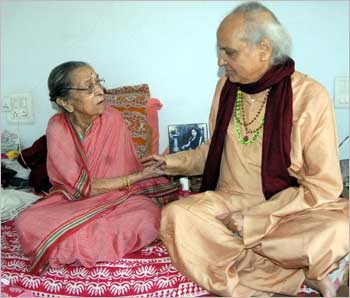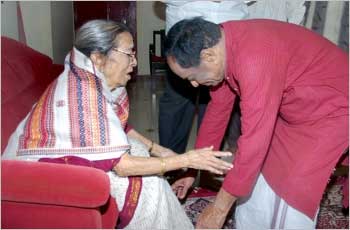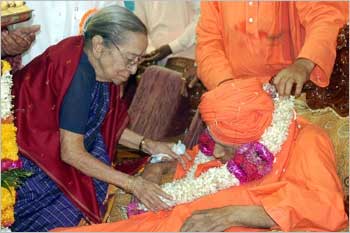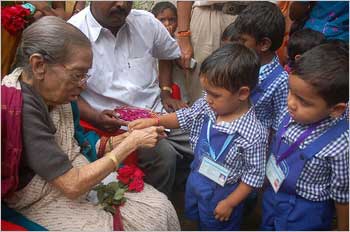 | « Back to article | Print this article |
Gangubai Hangal's demise marks the end of an era
The death of Gangubai Hangal, who had become a legend in her own time, marks the end of an era in the realm of Hindustani classical music. She has been one of few exponents of the Kirana Gharana style of music who stuck to the purity and averse to going in for experimentations, as has been wont with many of the musical celebrities.
Despite reaching rather the dizzying heights in her specialized field, she was humane, humble and unostentatious to the core. She would rub to shoulder to shoulder with many of the giants in the field as well with the commoners with due aplomb. Though the fame beckoned her, she firmly stood rooted to her native town Hubli in North Karnataka.
She along with the illustrious Mallikarjun Mansur, and Pandit Basavaraj Rajguru had carved out Northern Karnataka has the outpost of the Hindustani classical music in a region known for its love and commitment to the Carnatic music. Another veteran Pandit Bhimsen Joshi is a product of this region but moved to over Pune in the later years to make a career in music.
Hubli in the days preceding the reorganization of states, was part of the Bombay presidency and had more links with Mumbai and Pune in the north than with Bangalore in the southeastern end. And the plethora of the small princely states, all vassals of the Peshwa regime of Pune tattooing the region all around, had helped kindle and sustain the interest in the Hindustani music, thanks mainly to the patronage extended by the chiefs of the principalities around.
It was because of this that Hubli Dharwad and Belgaum had proved to be home ground for the local musical talent to blossom. Since Hubli was on the main trunk rail route connecting Bangalore and Pune, the connoisseurs of the area had had the good fortunes of listening to the music of other titans invited to the perform in Mysore, to touch down in these places on their homeward journey.
In particular the presence of the trinity of the Hindustani classicists had made Hubli Dharwad, known as the home of the mouth watering pedha, as a southern mecca of the Hindustani classics. With the passing away of Mallikarjun Mansur and Rajguru a few years ago, hers was the lone frail of shoulders, which carried gamely the banner of the Hindustani classical music along with traditions of the Kirana Gharana School of music.
Text: M Madan Mohan
"We learnt the ragas without even knowing the names"
Though she had some initial practice with the locally available gurus, Gangubai got a break with the chance meeting of another music legend of the area Ramrao Kundgolkar, otherwise popularly known as Savai Gandharva, who became her mentor. Savai Gandharva was a native of Kundgol near Hubli, who rose to fame after being noticed by the legendary Abdul Karim Khan during the concert in Kundgol. Gangubai along with Bhimsen Joshi, Firoze Dastur were among the first batch of disciples of Savai Gandharva. Bhimsen Joshi, who has made Pune as his home and Gangubai who has remained steadfast in Hubli, regularly organize the music tribute on the death anniversary of their mentor. While Bhimsen Joshi organizes in Pune, Gangubai organizes in the Kundgol, the native town of her mentor and despite her failing health she has never missed performing on the occasion.
Savai Gandharva moved over to Bombay when he fell ill and Gangubai followed him to continue her tutelage and the guru proved to be task master put her through rigorous schedule and would not stop the practice till he was satisfied. Gangubai often used to cite an occasion where she was to practice one particular phase of morning from morning to evening without a break, She cosseted herself in a room and practiced that phrase for around 200 times and stopped only when her Guru asked her to do
She had quite vivid memories of the training under Savai Gandharva. "I was so overawed by the Guru that I hardly dared to ask questions. We often learnt the ragas without even knowing the names. I was even scolded once for rendering raag Bhibas in a radio programme, for introducing inadvertently a note which was alien to the tradition followed by my Guru". A throat operation in the meantime had changed the tonal qualities, introducing the manly overtone and she was happy because it had resemblances to the voice of her Guru.
'Her daughter's death haunted her'
Though Gangubai made Hubli her home, recognition came to her from outside, mostly in Bombay and other North Indian towns. Calcutta and Bombay were here favourite places and the her modest home in Deshpande nagar a quiet residential locality has played a host to many visiting eminent men of music There has been no dearth of awards which poured on her and she had had the unique distinction of receiving three Padma awards, namely the Padmashri, the Padma Bhushan and the Padma Vibhushan. The State Government had recommended her name for the Bharat Ratna award too.
Her life long companion has been her daughter Krishna, who had emerged as an eminent singer and used to accompany her mother in all their concerts. Krishna's death, a couple of years ago, created a void in her life which was hard to fill and the memory of her daughter used to haunt her always.




